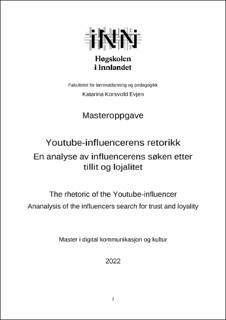Youtube-influencerens retorikk En analyse av influencerens søken etter tillit og lojalitet
Master thesis
Permanent lenke
https://hdl.handle.net/11250/3019360Utgivelsesdato
2022Metadata
Vis full innførselSammendrag
Denne masteroppgaven omhandler hvordan influencere på den sosiale medieplattformen Youtube forsøker å skape tillit og lojalitet hos sitt publikum gjennom sin retorikk. Oppgaven fokuserer hovedsakelig på å undersøke hvordan influencerene bruker retoriske grep som kan skape en opplevelse av nærhet og troverdighet, som videre kan medføre tillit og lojalitet hos et relativt stort publikum bestående av mennesker de aldri har møtt, og til tross for avstanden digitale kommunikasjonsformer medfører. Oppgaven er teoretisk forankret i utvalgte begreper fra både den klassiske retorikken og nyretorikken, samt andre relevante begrep relatert til digitale medier og influencerkultur. I analyse-kapittelet presenteres og analyseres en rekke ulike eksempler hentet fra videoene til en gruppe utvalgte Youtube-influencere. Videoene som er brukt i analysen er hentet fra en begrenset tidsperiode, og med avgrensninger som sørger for at fokuset i eksemplene ligger på direkte appeller fra influencer til publikum. Eksemplene som analyseres er delt inn i kategorier som, basert på analysen, kan sies å representere ulike ledd som inngår i å skape et helhetsinntrykk av nærhet, og derigjennom tillit og lojalitet. Hovedsakelig omfatter disse kategoriene identifikasjon, forming av tilhørernes virkelighetsoppfatning gjennom retorikk, og de retoriske appellformene etos og patos. Eksemplene i analysen viser at dette primært gjøres ved å forsøke å skape en opplevelse av at publikum har en nær relasjon til influenceren, at det å se på videoene fungerer som en måte å tilbringe tid sammen med influenceren på, og at det å abonnere på Youtube-kanalen til influenceren og å bli en del av influencerens faste følgergruppe fungerer som en måte å ta del i et fellesskap sammen med influenceren på. Ut ifra analysekapittelet og de mønstrene som kommer fram gjennom fellestrekk i tilnærmingene hos de ulike influencerne, kan oppgaven bidra med en form for kartlegging av hvilke ledd som inngår i influencerens nærhetsskapende retorikk, og hvordan disse brukes til å skape en helhet som forsøker å vinne publikums tillit og lojalitet. This masters thesis is about how influencers on the social media platform Youtube try to create trust and loyality in their audience through their rhetoric. The thesis is mainly focusing on how the influencers use rhetorical approaches that create a sense closeness and credibility which from there can lead to trust and loyality in a relatively speaking large audience consisting of people they’ve never met, and despite the distance existing in digital forms of communication. The thesis is theoretically grounded in selected terms from both the classical and the new rhetoric, as well as other relevant terms related to digital media and influencer culture. In the analysis-chapter a selection of examples from a group of selected Youtube-influencers are presented and analyzed. The videoes that are used in the analysis are selected from a limited timeframe, and with delimitations which ensure that the focus in the examples is on direct appeals from the influencer to the audience. The examples that are analyzed are sorted into categories which, based on the analysis, can be said to represent different aspects that work as parts of a whole in regards to creating closeness, and through that trust and loyality. These categories mainly consist of identification, shaping the audiences idea of reality through rhetoric, and the rhetorical forms of appeal called ethos and pathos. The examples in the analysis show that this mainly is done by trying to create the impression of a close relationship between the audience and the influencer, as well as the impression that watching the videos works as a way to spend time with the influencer, and that subscribing to their Youtube-channel works as a way to take part in a community with the influencer. Based on the analysis-chapter and the patterns that are revealed through common traits in the approaches of the different influencers, this thesis can contribute a sort of mapping of which aspects play into the influencers rhetoric for creating closeness, and how these are used to create a rhetoric that attempts to win the audience’s trust and loyality
